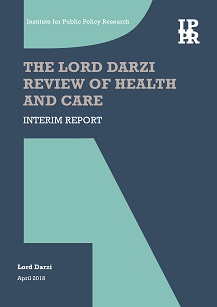NHS to need more efficiencies in optimistic funding scenario

He continued: ‘As a result, we are seeing signs of a system under strain all around us: patients left in corridors; operations cancelled; and deficits on the rise. Simply demanding more for less or promising more money without a plan for better care isn’t good enough.’
The report concluded that demand pressures will rise to £200bn by 2030, without changing the way the health service works. If the NHS is returned to its long-term average annual increase in funding, which the report describes as the most optimistic scenario, the budget would rise to £173bn by 2030. This would leave the service to deliver the balance in efficiency savings (£27bn). The report notes this would be 1.4 times its long-run efficiency trend.
In addition, social care would need a further £10bn, as a bare minimum, to maintain existing service levels, it said.
The review will now look into the funding system and will present the full costs for both health and social care in a final report.
Lord Darzi warned difficult conversations with the public lay ahead. ‘Voters may want northern European public services at American tax rates, but this is simply not possible. But it also shows that simply pouring more money into health and care will not be enough. The health and care system will need bold reform – and significant productivity increases – to be fit for the future,’ the report said.
The future sustainability of the NHS was debated in the House of Lords at the end of April, following the report of the Lords’ Committee on the Long-term Sustainability of the NHS.
Lord Patel, who chaired the committee, welcomed the government’s indication that a long-term settlement would be forthcoming. ‘How much and what it will be used for will be the important question.’
He added: ‘Lack of any long-term planning for the workforce is the biggest internal threat to the sustainability of the NHS and adult social care. Much of the workforce planning is fragmented. Too much training of our workforce is done through the old model, lacking flexibility and with poor opportunity to upgrade skills.’
Lord Patel, a crossbench peer and obstetrician, said prevention of ill-health was a key component of the Five-year forward view, but it had received little attention. ‘A service centred on illness is not sustainable,’ he added.
The government had enacted one of the Lords’ committee’s key recommendations – that the Department of Health also be given responsibility for social care to support a more joined-up approach. However, he said less progress has been made in other areas including establishing an Office for Health and Care Sustainability, which would look ahead to the funding needed over the next 15-20 years.
Related content
We are excited to bring you a fun packed Eastern Branch Conference in 2025 over three days.
This event is for those that will benefit from an overview of costing in the NHS or those new to costing and will cover why we cost and the processes.